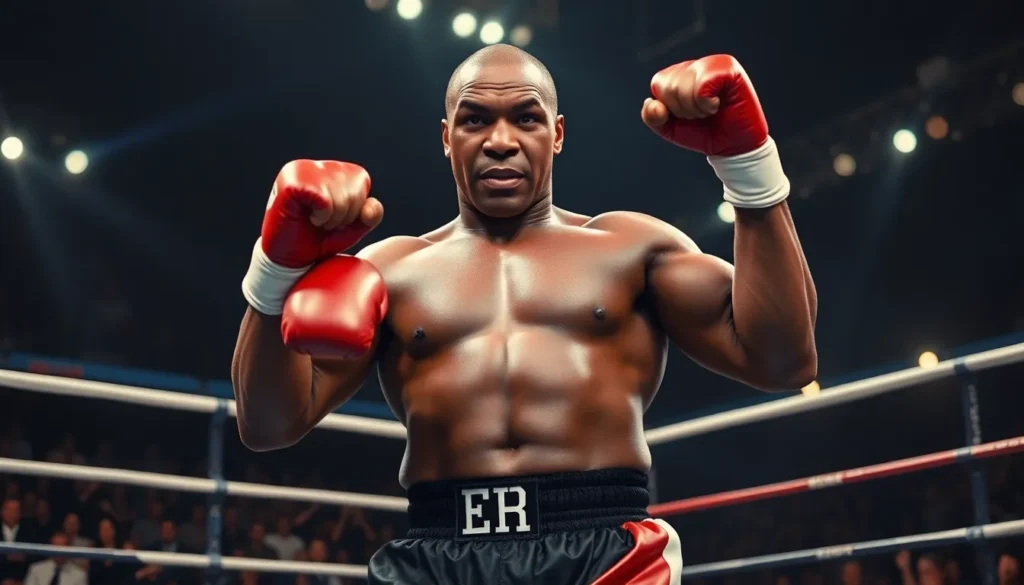Table of Contents
ToggleMike Tyson, a name synonymous with boxing greatness, is one of the most iconic figures in sports history. Known for his ferocious style and unmatched power, Tyson’s career has captivated fans around the world. His record reflects not just victories but a complex journey through the highs and lows of professional boxing.
With a career that spans several decades, Tyson’s statistics tell a compelling story of talent, determination, and controversy. Understanding his record provides insight into his legacy and the impact he’s had on the sport. From his early days as a young champion to his later bouts, Tyson’s journey is a testament to resilience and the relentless pursuit of excellence in the ring.
Overview of Mike Tyson’s Career
Mike Tyson’s career in boxing is marked by extraordinary achievements and notable challenges. Turning professional in 1985 at the age of 18, Tyson quickly established himself as a dominant force in the heavyweight division. His aggressive style and explosive power led to a rapid ascent, capturing the WBC title in 1986.
Tyson became the youngest heavyweight champion in history at 20 years old, a record that still stands. Throughout his career, he secured a total of 50 wins, with 44 of those by knockout. Known for his ferocity in the ring, Tyson’s quick victories included numerous bouts that ended in the first round. He unified the heavyweight titles in 1987, making him the first fighter to hold the WBA, WBC, and IBF titles simultaneously.
Tyson’s career, however, faced significant obstacles. Legal troubles and personal challenges led to a three-year imprisonment for a conviction in 1992. After his release, he attempted a comeback with varied success. Although Tyson’s journey included a decline in performance, he remained a controversial figure in boxing.
Despite setbacks, Tyson’s impact endures. His fierce reputation and unique persona shaped boxing’s landscape and drew global attention to the sport. Today, he is remembered not just for his impressive statistics but also for the complexities that defined his career.
Early Life and Rise to Fame

Born on June 30, 1966, in Brooklyn, New York, Mike Tyson experienced a tumultuous childhood. Raised in a challenging environment, he found solace in boxing, which ultimately set the stage for his legendary career.
Boxing Background
Tyson began training at the age of 13 under the guidance of Cus D’Amato, who recognized his potential and became a pivotal figure in his life. D’Amato instilled discipline and focus, transforming Tyson into a formidable fighter. Ironically, Tyson’s amateur career saw him win various championships, culminating in a gold medal at the 1981 Junior Olympic Games. By the time he turned professional in 1985, he had honed an aggressive fighting style that combined speed and power.
Key Fights and Milestones
In his early professional bouts, Tyson showcased his explosive talent. Notably, he claimed his first title, the WBC heavyweight championship, by defeating Trevor Berbick on November 22, 1986, at just 20 years old. Tyson’s record-setting victory made him the youngest heavyweight champion in history. On March 7, 1987, he unified the heavyweight titles by defeating James Tillis, followed by a victory over Tony Tucker on August 1, 1987. Tyson’s dominance continued as he defeated fight legends like Larry Holmes and Frank Bruno, securing a status as a boxing icon. By the end of 1987, Tyson held the WBA, WBC, and IBF titles simultaneously, cementing his legacy in the sport.
What Is Mike Tyson’s Record?
Mike Tyson’s boxing record is a testament to his explosive talent and formidable career in the ring. His professional career spans several decades, showcasing a mix of victories and challenges.
Total Fights
Mike Tyson participated in a total of 58 professional fights throughout his career. This count includes bouts from both the early years and later stages of his boxing journey. His ability to draw significant crowds exemplifies his impact on the sport.
Wins and Losses
Out of 58 fights, Tyson secured 50 wins and faced 6 losses. This record highlights his dominance in the heavyweight division during his peak years. Additionally, he achieved 2 no contests, further demonstrating his competitive nature and resilience as a boxer.
Knockouts and Decisions
Of his 50 victories, 44 came by way of knockout, solidifying Tyson’s reputation for power and aggression in the ring. Only 6 of his wins were decided by judges’ decisions, indicating his penchant for finishing fights early. This knockout ratio distinguishes him as one of the most feared hitters in boxing history.
Notable Achievements
Mike Tyson’s boxing career features numerous significant accomplishments that solidify his legacy in the sport. His championship titles and Hall of Fame induction highlight his prowess and impact.
Championship Titles
Tyson’s championship journey is remarkable. He claimed the WBC heavyweight title at 20 years old, becoming the youngest heavyweight champion in boxing history. In 1987, he unified the heavyweight division by winning the WBA and IBF titles, making him the first fighter to hold these three prestigious titles simultaneously. Throughout his career, Tyson successfully defended his titles multiple times, including notable wins against fighters like José Ribalta, Michael Spinks, and Buster Douglas. His tenure as a champion demonstrated his skill, power, and competitiveness in the ring.
Hall of Fame Induction
In recognition of his contributions to boxing, Tyson was inducted into the International Boxing Hall of Fame in 2011. This prestigious honor acknowledges his exceptional career and the influence he has had on the sport. His induction symbolizes not only his achievements in the ring but also his enduring legacy as one of boxing’s most iconic figures. Tyson’s story resonates with fans and aspiring boxers alike, serving as a testament to talent, resilience, and determination.
Legacy and Impact on Boxing
Tyson’s legacy encompasses a transformative influence on the sport of boxing. His electrifying style and knockout power revolutionized heavyweight boxing in the 1980s. Tyson introduced an aggressive approach, emphasizing speed and ferocity over traditional tactics.
Tyson’s impact extends beyond the ring. He inspired a newfound interest in boxing among younger generations, drawing in fans with his charismatic persona. His journey through triumph and adversity resonates with many, showcasing resilience and determination.
The combination of his unique fighting style and distinctive background contributed to the cultural narrative of boxing. Tyson became a symbol of both the heights of success and the depths of personal struggle, affecting public perception of athletes in general.
Tyson’s presence reshaped the boxing landscape, creating increased media attention and commercial opportunities. His bouts generated record pay-per-view revenues, with bouts against opponents like Evander Holyfield and Lennox Lewis becoming iconic events.
In educational settings, Tyson’s story serves as a case study for potential athletes and individuals facing challenges. His life illustrates both the rewards of hard work and the consequences of poor choices, emphasizing the complexities of fame in sports.
Overall, the cumulative effect of Tyson’s career cements his status as a pivotal figure in boxing history, influencing not only the sport but also popular culture and societal views on athletes.
Mike Tyson’s boxing record is a testament to his unparalleled talent and fierce determination. With 50 wins and an astounding knockout ratio, he remains one of the most formidable fighters in history. His journey from a troubled youth to a heavyweight champion showcases not only his athletic prowess but also his resilience in the face of adversity. Tyson’s influence extends beyond the ring as he reshaped the sport and inspired countless fans and fighters alike. His legacy endures as a pivotal chapter in boxing history, reminding everyone of the power of grit and passion in achieving greatness.




